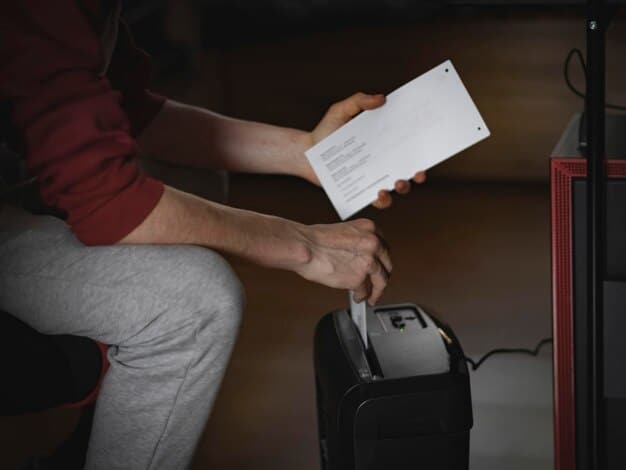Emergency Rental Assistance: How to Apply Before Funds Run Out

Emergency Rental Assistance programs provide crucial financial aid to renters struggling to pay rent and utilities; these programs are generally administered at the state and local levels, offering a lifeline to those at risk of eviction.
Are you struggling to keep up with rent payments? You’re not alone. The Emergency Rental Assistance program may be able to offer some help before the funds run out.
Understanding Emergency Rental Assistance
Emergency Rental Assistance (ERA) programs were established to help households that are unable to pay rent and utilities due to the COVID-19 pandemic. These programs are primarily funded by the federal government but are administered by state and local entities, tailoring the assistance to meet the specific needs of their communities.
The availability of funds is finite, and application processes can vary significantly by location, making it crucial for eligible individuals to apply as soon as possible.

Key Objectives of ERA Programs
ERA programs aim to prevent evictions, ensure housing stability, and provide financial relief to both renters and landlords.
- Preventing Evictions: Offering funds to cover back rent and prevent displacement.
- Ensuring Housing Stability: Helping families maintain stable housing during financial hardships.
- Providing Financial Relief: Alleviating the financial burden on renters and landlords alike.
Many programs prioritize assistance to lower-income households and those at the highest risk of eviction, ensuring that assistance reaches those who need it most. These programs not only support individual families but also contribute to the overall economic stability of communities by reducing homelessness and housing instability.
In summary, Emergency Rental Assistance programs are vital resources for families and communities facing housing crises, providing crucial financial support and promoting long-term stability. These programs play a key role in maintaining community resilience and economic well-being during times of crisis.
Eligibility Criteria for Rental Assistance
To qualify for Emergency Rental Assistance, applicants generally need to meet specific criteria related to income, housing status, and demonstration of need. Understanding these requirements is the first step in determining whether you are eligible to apply.
Each program may have slightly different eligibility rules, so checking the details for your local program is essential.
Income Requirements
Most ERA programs require applicants to have an income at or below a certain percentage of the area median income (AMI). This threshold varies, but it often falls between 50% and 80% of AMI. For example, a program might specify that eligible households must have an income no higher than 60% of the area’s median income.
- Documentation: Applicants usually need to provide documentation such as pay stubs, tax returns, or other proof of income.
- Income Limits: These limits are set by HUD and vary by location, so check the specific requirements for your area.
Housing Status
Eligible applicants must typically be renters, meaning they have a formal or informal agreement to pay rent for their housing. Some programs also extend eligibility to those living doubled up or in other non-traditional housing arrangements, provided they can demonstrate a tenant-landlord relationship.
Additionally, it’s common for programs to require that the rental property be the applicant’s primary residence. This means the applicant must live at the property for the majority of the time.
Demonstrating Need
Applicants must demonstrate that they have experienced financial hardship due to the COVID-19 pandemic, such as job loss, reduced work hours, or increased expenses. This hardship must have made it difficult for them to pay rent or utilities.
Overall, eligibility for Emergency Rental Assistance requires meeting specific income thresholds, demonstrating renter status, and providing evidence of financial hardship. Understanding these criteria is crucial for anyone looking to apply for rental assistance, and it ensures that the support is directed to those who need it most.
Gathering Necessary Documentation
Before applying for rental assistance, it’s essential to gather all the necessary documentation to support your application. Having these documents ready will streamline the application process and increase your chances of approval.
Typical documentation includes proof of income, identification, rental agreements, and evidence of financial hardship.

Essential Documents for Your Application
The specific documents required can vary by program, but there are several common items you should prepare.
- Proof of Income: Pay stubs, tax returns, bank statements, or a letter from your employer.
- Identification: Driver’s license, state-issued ID, passport, or other government-issued identification.
- Rental Agreement: A copy of your current lease or rental agreement.
- Evidence of Hardship: Documents showing job loss, reduced hours, medical bills, or other financial difficulties caused by the pandemic.
Additionally, you might need to provide utility bills if you are seeking assistance with utility payments. Check the specific requirements of the program you are applying to, to ensure you have everything needed.
Remember to organize your documents in a clear and accessible format, as this can significantly simplify the application review process. Properly prepared documentation can make the difference between a smooth application and a delayed or denied one, ensuring you receive the assistance you need in a timely manner.
Navigating the Application Process
Applying for Emergency Rental Assistance involves several steps, from locating the correct program to submitting your application. Understanding each phase can help you navigate the process more efficiently and increase the likelihood of a successful outcome.
The process usually begins with identifying the appropriate program in your area and carefully following the application instructions.
Step-by-Step Guide to Applying
Here’s a detailed breakdown of the steps involved in applying for rental assistance:
- Find Your Local Program: Search online for rental assistance programs in your city, county, or state. Start with your state’s housing agency website.
- Review Eligibility Requirements: Ensure you meet the income, residency, and hardship criteria.
- Gather Required Documents: Collect all necessary documents, such as proof of income, identification, and rental agreements.
- Complete the Application: Fill out the application form accurately and thoroughly, either online or in person.
- Submit Your Application: Follow the instructions for submitting your application, ensuring all required fields are completed.
- Follow Up: After submitting, follow up to check on the status of your application and provide any additional information requested.
Pay close attention to deadlines and any specific instructions provided by the program, as these can significantly impact your application’s success. If you need assistance, many programs offer resources such as call centers or walk-in support to help guide you through the process, and don’t hesitate to utilize these resources.
Common Challenges and How to Overcome Them
Applying for rental assistance can be challenging. Some common obstacles include complex application processes, documentation requirements, and communication issues. Addressing these challenges effectively can improve your chances of receiving aid.
Fortunately, many of these hurdles can be overcome with preparation, persistence, and the right resources.
Tips for a Smoother Application
Here are some strategies to handle common issues and ensure a smoother application process:
- Be Prepared: Have all required documents ready before you start the application.
- Follow Instructions Carefully: Read and understand all application instructions thoroughly.
- Seek Help: Contact the program’s support services for assistance if you are unsure about any steps.
- Stay Organized: Keep track of your application status and any communications with the program.
Additionally, it’s essential to be proactive in addressing any questions or requests for additional information from the program administrators. Promptly responding to inquiries and providing accurate information can prevent delays or denial of your application. By anticipating and addressing these challenges head-on, you can navigate the rental assistance application process with confidence and improve your chances of securing the aid you need.
Ultimately, a smooth application process requires preparation, diligence, and effective communication. By understanding the common challenges and implementing these strategies, you can increase your likelihood of receiving rental assistance and maintaining stable housing during challenging times.
What to Do if Funds Run Out
If you are unable to secure rental assistance due to depleted funds, it is vital to explore alternative options to prevent eviction and maintain housing stability. There are several strategies and resources you can turn to in such circumstances.
These alternatives include seeking support from local charities, negotiating payment plans with your landlord, and exploring other government assistance programs.
Exploring Alternative Resources
When ERA funds are no longer available, consider the following options:
- Local Charities: Contact local charities and non-profit organizations that provide emergency financial assistance for housing.
- Negotiate with Your Landlord: Communicate with your landlord to explore payment plans or temporary rent reductions.
- Other Government Programs: Investigate other government assistance programs, such as Supplemental Nutrition Assistance Program (SNAP) or Temporary Assistance for Needy Families (TANF).
Additionally, it’s essential to seek legal advice if you are facing eviction. Many legal aid societies offer free or low-cost services to tenants facing housing crises, and these services can advise you on your rights and represent you in court if necessary. In these circumstances, leveraging every available resource is critical for preventing eviction and ensuring stable housing.
| Key Point | Brief Description |
|---|---|
| 🏠 Eligibility for ERA | Income limits, renter status, and hardship due to COVID-19 are typically required. |
| 📄 Required Documents | Gather pay stubs, ID, lease, and proof of job loss or medical bills. |
| ✍️ Application Steps | Find your local program, review rules, apply, and follow up on status. |
| 💰 Alternative Options | Explore local charities negotiation and legal aid if ERA funds are depleted. |
Frequently Asked Questions
▼
ERA is a program that provides financial assistance to renters struggling to pay rent and utilities due to the COVID-19 pandemic. These programs are usually run by state and local entities and offer a way to avoid eviction.
▼
Eligibility typically includes renters with income at or below a certain percentage of the area median income, who have experienced financial hardship due to COVID-19, and are at risk of homelessness or housing instability.
▼
Common documents include proof of income (pay stubs, tax returns), identification (driver’s license, passport), rental agreement, and evidence of financial hardship (job loss notice, medical bills).
▼
Search online for rental assistance programs in your city, county, or state. Start with your state’s housing agency website to find local programs, or by simply searching “rental assistance near me.”
▼
If ERA funds are depleted, explore local charities, negotiate with your landlord for payment plans or rent reductions, and investigate other government assistance programs like SNAP or TANF. Seek legal advice if facing eviction.
Conclusion
In summary, securing Emergency Rental Assistance is a crucial step for those struggling with rent payments. By understanding the eligibility criteria, gathering necessary documents, and navigating the application process effectively, you can increase your chances of receiving aid and maintaining stable housing. If ERA funds are depleted, remember to explore alternative resources to prevent homelessness and seek legal advice if necessary.





